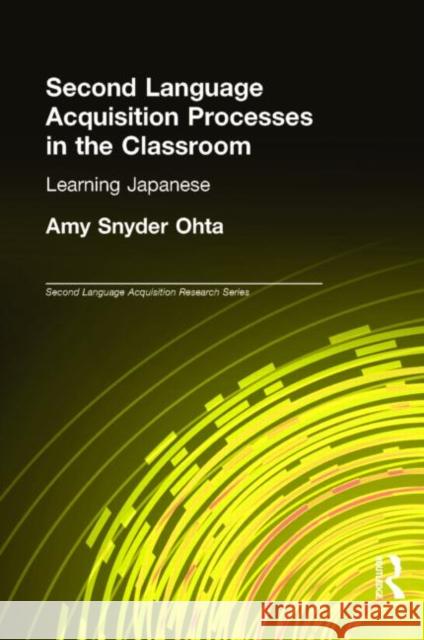Second Language Acquisition Processes in the Classroom: Learning Japanese » książka
Second Language Acquisition Processes in the Classroom: Learning Japanese
ISBN-13: 9780805838008 / Angielski / Twarda / 2001 / 316 str.
Second Language Acquisition Processes in the Classroom: Learning Japanese
ISBN-13: 9780805838008 / Angielski / Twarda / 2001 / 316 str.
(netto: 744,80 VAT: 5%)
Najniższa cena z 30 dni: 730,42
ok. 22 dni roboczych.
Darmowa dostawa!
This book is the first study to examine how interactional style develops within the walls of a foreign language classroom in the first two years of language study. Results show learners to be highly sensitive to pragmatic information and that learners can move toward an appropriate interactional style through classroom interactive experience.
The book shows how learners are most often sources who offer assistance and correction, with errors serving most often to stimulate further thinking about what form is correct. Analysis shows learners to be active in seeking corrective information in the classroom setting, not only from peer partners but also from the teacher. They are active in noticing how the teacher's utterances--even when addressed to others--contrast with their own, and utilize corrective feedback intended for other students. In addition, the results show that teacher-initiated corrective feedback addressed to individual learners is only one source of corrective feedback. Learners are shown to be active in both teacher-fronted and peer interactive settings.
In newer L2 teaching methodologies which focus on the use of peer interactive tasks, the teacher's role has been de-emphasized. This book, however, shows how important the teacher's role is. The final chapter examines how the teacher can act to maximize the benefits of peer interactive tasks through how they design tasks and present them to the class. First, the chapter looks at how learners use English--their L1--in the classroom, concluding that how teachers present activities to the class has an impact on the amount of L1 used by students during peer interaction. Following up on this finding, the chapter works to address questions that teachers face in lesson planning and teaching. It presents a useful list of questions teachers can ask when designing peer interactive tasks in order to maximize the effectiveness of a wide variety of language learning tasks.











